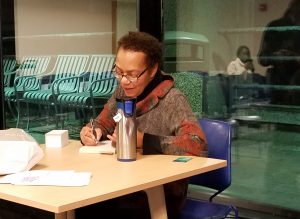
At the latest installment of the Distinguished Writers Series, author, photographer and pilot Lauret Savoy discussed how the many avenues of her life have been devoted to finding her origins, mining each for anecdotes of that search.
In large round glasses, her head reaching just over the podium, she read from her most recent work, “Trace: Memory, History, Race, and the American Landscape.”
“It was all based on questions,” she said, “Questions of not knowing a sense of identity.” She recounts a childhood with a black mother and white father, whose death revealed that he was also a novelist who was blacklisted for writing about the possibility of communism in America. Much of her work now derives from a childhood where she sometimes felt the absence of a parent.
“I come from a family that was silent and silenced,” she recalls, having blamed herself as a child for how bitter she perceived her father to be. Now, however, she tries to find the comfort she lacked then in the world around her. Her book is built on the premise of understanding where she comes from, especially as a person of mixed-race.
Presented by the Creative Writing MFA program, the series encourages students—aspiring to the MFA program or not—to listen as writers like Savoy detail their trajectories as writers and leaders in their fields. Future writers in the series include Elizabeth Strout on March 15th, 2019 and Deborah Eisenberg on April 9th, 2019. Savoy was introduced as an “uncategorizable” writer.
“We love the way she combines life writing with ecology,” said Gabriel Packard, associate director of the MFA program and the organizer of the series.
Reading from the prologue of her text, Savoy was emotive and breathy. The sharp contrast between her childhood and her more empowered adulthood is evident in her changing tone, and the prologue ends with an invitation to the reader. She hopes that in her own journey, readers may find a part of themselves as well.
In the Q&A following the reading, MFA sophomore Leilani Zee presented her own connection to the piece. As a woman who is partly Puerto Rican but has no connection to her heritage due to an absent father of her own, she wanted to know where Savoy stood on the idea of race as a construct. Savoy expressed that it was certainly social.
“I’m using the search for my father’s people as a way to explore the place of race in this country,” Savoy added. Much of her narrative, book aside, is built on similar, weighty questions: What am I? What are we to the history of this land?
For her, heritage means understanding many worlds and cultures: slaves, colonizers and indigenous people. She said she’d felt long estranged from time and place, but it’s clear that her journey is only just started.
“Come with me,” she urged, quoting her own words from her book. “We may find that home lies in remembering.”

